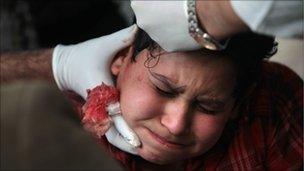Calls for protection for doctors in Bahrain and Libya
- Published

Doctors need the freedom to carry out their professional work wherever they are
"They have detained two doctors. Their families say security forces took them from the hospital yesterday. We don't know where they are."
A doctor working at Salmaniya Hospital in the Bahrain's capital city Manama describes the worrying disappearance of two colleagues.
His is just the latest report of medical personnel being intimidated and attacked while trying to do their job in difficult circumstances.
"Everybody is frightened. We fear for the future," he said, refusing to give his name.
Manama's main hospital is now a military hospital after Bahrain's security forces occupied it. The doctors who were inside at the time could not leave. Doctors who were at home at the time were not allowed to enter the hospital and treat civilians.
"We hope it can go back to normal and military rule will finish as soon as possible," the doctor said.
"In the meantime we have to co-operate with military commanders. We have no other option."
'I was humiliated'
Aallaa, another doctor working at the main hospital in Manama, told BBC News: "The whole hospital was surrounded by tanks, ambulances were stopped form helping the injured and we were forbidden from treating injured people."
When she attended riots at the university to help with the wounded, Aallaa said one doctor was hit with a stick and another was threatened with a knife.
"They threatened to kill me too. There were all sorts of threats and I was humiliated too," she said.
"But all my colleagues are standing by our patients regardless of ethnicity or race."
The World Medical Association, which represents more than nine million physicians in 97 countries, says it is alarmed by the growing threats to its members.
The UN human rights chief, Navi Pillay, condemned the use of force by security forces in Bahrain. She also warned that takeovers of medical centres was a blatant violation of international law.
"This is shocking and illegal conduct," she said.
The World Medical Association (WMA) is now calling on the Bahrain authorities to have these attacks investigated fully and independently, and for those responsible to be brought to justice.
Amnesty International also said the attacks were unprovoked and unjustifiable and in breach of international law enforcement standards.
'Under siege'
Dr Wonchat Subhachaturas, president of the WMA, said: "Physicians have an ethical duty to care for their patients, and governments have a duty to ensure that appropriate conditions exist to allow them to do so."
Another unnamed doctor from Manama told World Today he was trapped in the hospital for three days.
"At the moment we are seized by police and army and there's no way in or out and we have lack of food. We are really exhausted.
"And we have many serious injuries from different local centres. We cannot bring them safely here.
"Some doctors were assaulted and beaten by army and the police outside. We are really suffering."
"We are under siege," said Nihad el-Shirawi, an intensive care doctor who said she had been working for 48 hours at the hospital. "We cannot leave, and those on-call cannot come in."
'Lack of basics'
In Libya the International Red Cross has withdrawn from the city of Benghazi, controlled by anti-government rebels, because of fears that an attack by pro-Gaddafi forces could be imminent.
Dr Abdulmajid Ali, a Libyan-born surgeon, told the World Service what he saw while he was there: "There is no infrastructure in Libya at all and especially in the health-care system which is virtually zero.
"The Libyans who are lucky enough to (be able to) afford it go to Egypt and Tunisia for medical treatment. But now there is a huge influx of casualties and the people there are not coping.
"Sometimes we have about five, six casualties that need an immediate operation to save their lives and we have only one (operating) theatre or we don't have equipment to try to stop the bleeding or do an operation. There is basically lack of the basics," Dr Ali said.
Dr Subhachaturas said doctors must be granted access to patients, medical facilities and equipment and the protection needed to carry out their professional activities freely - whether in times of peace of conflict.
"We will now be considering whether more should be done by the international community to collect evidence of assaults on medical personnel and facilities to enable those responsible to be prosecuted," he said.
- Published16 March 2011
- Published20 February 2011